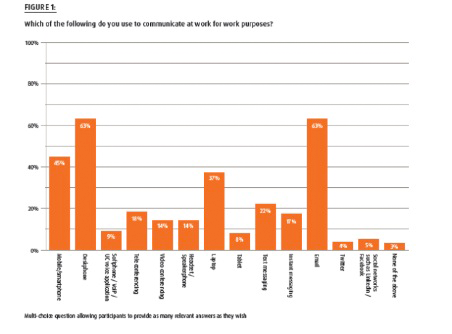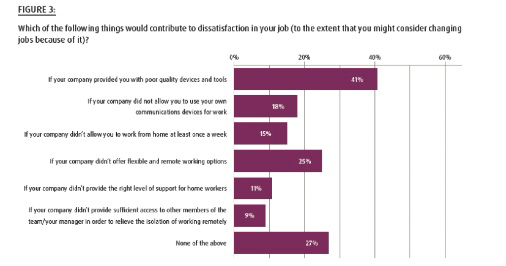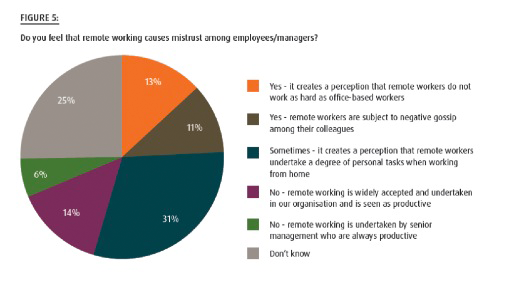
In many ways, the picture we uncovered was less optimistic than we predicted a year ago; transformation is happening in the workplace, but in many ways the new technology that is enabling the modern workplace revolution is also creating some challenges that need to be addressed if employers are to realise the benefits of flexible working.
Our survey reflected the ambivalence of Government guidelines on flexible working, which states that anyone can ask to work flexibly - and employees who care for someone have a legal right to ask – but also grants employers the right to refuse an application, offering multiple grounds to say no.
Yet other studies have shown that 77% of senior decision makers felt that remote working was essential or important to their organisation2, acknowledging the raft of benefits it can bring, by reducing office costs and improving staff recruitment, retention, morale and productivity.
Our survey confirmed that practically everyone in today’s workplace has some experience of remote working – either working at home or from another location or working with colleagues who are not in the office. And we found that this experience was not always positive:
The role of verbal and face-to-face communication is greatly undervalued in the modern workplace.
75% of today’s workforce admits to experiencing some form of emotional or interpersonal problem or even mental health issue.
Remote working – and the communication devices and platforms that support it - can create a sense of isolation as much as a sense of connection.
Modern workers want the work-life balance that flexible working can provide, but are working out of office hours more than ever.
Remote workers are subject to mistrust and receive negative gossip and are sometimes perceived as untrustworthy or unproductive.
Tools and Productivity
Given that 69% of us either work remotely or work with colleagues who work remotely, it’s no surprise that we use a multitude of ways to keep in touch with co-workers. Today’s office worker might be used to switching seamlessly between multiple locations, communication devices and platforms, but the more traditional deskphone and email remain by far the most popular communication methods.
GenM is less happy with IT and communications tools today than a year ago
Having the right tools for the job might be a major driver of job satisfaction, but our survey suggests GenM is actually less satisfied with its IT and communications tools than a year ago: In 2012 one in five people told us they did not have the IT and communications tools they needed to work the way they want; in 2013, just 40% are actually satisfied that they have the tools they need to get the job done.
This trend seems to be having most impact upon the contact centre where just 26% were satisfied they had the right tools for the job.
4 in 10 people would actually change jobs for the right communications tools
Last year we found that having the right tools and devices available to them at work was extremely important for GenM. In 2013 we discovered that a staggering 41% of workers think this is so important that they would consider switching jobs if they were given poor quality devices and tools and 18% would leave if they are not allowed to use their own communications devices for work. The BYOD (Bring Your Own Device) trend has definitely not gone away for GenM, but we found little evidence that employers were meeting workers’ expectations.
Voice call disconnect: Just how much do we really recognise the value of voice calls?
Our survey revealed a telling disconnect in GenM’s attitude to voice calls: while just one in three agreed with the statement that phone calls are still a very effective method of communication, the vast majority, (70%) agreed that speaking to colleagues over the phone or via video conferencing helps them to feel more connected with each other.
GenM is perhaps unaware that this ‘live’ human connection is absolutely fundamental to effective communication.
Most people believe they are most productive in the environment they work in right now. But a worrying number still think they could work better elsewhere.
A staggering 86% of people in our survey work from more than one environment. While the office was a clear winner in the productivity stakes, with 47% saying they were most productive here, 39% felt they were more productive in another location - a trend that should not be ignored. It seems that, with the tools available to us today, many of us have experienced productivity gains in other locations and are confident that we could repeat this to work effectively outside of the office on either a full or part-time basis.
UK workers value work-life balance. But they’re sacrificing it to work longer hours out-of-the-office than ever before
One year on, we’re placing an even higher priority on work-life balance, with 54% of workers agreeing that it is more important than a pay rise, compared to 27% in last year’s GenM report. Yet, ironically, we seem even further away from achieving it: 40% of people are regularly checking email outside of office hours, (up significantly from 19% in Jabra’s 2012 GenM study); and nearly one in five (18%) say they have a poor work-life balance.
What happened to the home working revolution? 74% of employers fail to even offer flexible working policies
The evidence is overwhelming:
7 out of 10 people in our survey either work from home or have colleagues that work remotely;
24% of workers want to work from home more often;
One in four people would consider changing jobs if their company didn’t offer flexible and remote working options;
15% would only take a new job in the future if it was remote or home-based; and
Just 14% would be willing to sacrifice work-life balance for a pay-rise.
Yet astonishingly, despite the fact that staff are so hungry for it, three out of four employers still don’t offer a flexible working policy, in spite of the fact that 77% of business leaders say flexible working is critical to their organisation’s future
One in five workers feels isolated and one in three suffers from poor relationships at work. Modern communications technology was meant to bring us closer together. Is it actually pushing us further apart?
With constant ‘presence’, voice or video and at the click of a button, friend streams and Twitter, it seems counter-intuitive to say that we could feel more isolated in today’s working environment. Yet the increased use of non-verbal electronic communications media does not seem to be improving our work relationships, or personal relationships for that matter; 12% of workers in our survey felt that work issues contributed to relationship breakdowns at home.
Interestingly, those working in contact centre environments experienced the highest levels of poor interpersonal relationships at work, at 35% and the highest level of isolation from their co-workers, at 22%. 21% of contact centre staff have reported breakdowns in home relationships, which is TWICE the level of any other group. Overall contact centre workers are the most unhappy group out of all the worker groups surveyed, with a massive 81% indicating some form of emotional or physical issue at work.
While communications technology brings many benefits, it should not be at the cost of the most fundamental, personal interactions; face-to-face and voice communication, which are essential to our well-being at work and in our personal lives.
One in four UK office workers suffers from exhaustion
Feelings of tension and exhaustion are running high in the modern workplace.
Shockingly, 24% of UK office workers have suffered from exhaustion. Clearly this should be seen as a problem. An exhausted worker is unlikely to be productive for very long, nor remain satisfied in their role. There are likely to be a variety of influences for this; from the gradual increase in working hours to the influence of an increasingly difficult global economy driving workers to work longer and harder.
But by valuing our employees we can ensure they remain loyal and are able to sustain themselves through periods of hard work
55% of office workers think home working breeds mistrust. And one in three think it can put your career at risk
While home workers enjoy the best mental health and wellbeing of the four groups of workers surveyed, their distance from the rest of the working population seems to breed suspicion between them and everybody else. To put it bluntly, home-working has an image problem; perhaps because it has not yet become ingrained in our culture in spite of the many benefits it brings in terms of employee satisfaction, productivity and retention. Overall just 14% of the people we interviewed said that remote working is widely accepted, undertaken in their organisation and seen as being productive.
Home working creates new issues, while solving old problems
Perhaps the most significant finding of our survey was that individuals’ experience and opinion of home and remote working can vary significantly. For example, we found that women valued home working much more than men, (23% would only take a new job if it offered remote working, compared to only 6% of men). However it is clear that the level of support provided by employers is the single most important success factor. When asked to choose one thing that best described their experience of home working, no clear consensus emerged, but we did identify a range of issues that employers need to address in order to make remote working fulfil its potential for their employees and the organisation as a whole (see Figure 6 below).
Where do we go from here?
We have more means of communicating today and more flexibility in how we can work, than ever before. What’s more, the modern workforce is highly diverse in its needs, both in terms of where it wishes to work and how it wishes to communicate. Those businesses that cater to this are already reaping the rewards of flexible working, but as our survey revealed, it requires a dedicated approach and a well thought-out strategy.
GenM is here to stay and is going to continue to bring new communications tools and platforms into the workplace. Yet, our research has demonstrated beyond any doubt that having good communications tools is not the same thing as having good communications. In today’s hyper-connected world, it is vital that people maintain a level of appropriate, personal, visual or verbal communication with colleagues. Employers need to foster ways of working that create closer connections with people, whether that be by voice, video and face-to-face methods or a Google hangout.
It is vital, from the point of view of group cohesion, that workers feel appreciated and part of a team. In adapting to the ‘brave new world’ of flexible and ubiquitous communication, true ‘personal’ communication should still be encouraged as much as possible.
Flexible working is already a way of life for GenM. By recognising this, senior decision makers will ensure that they have a policy that enables them to reap the benefits in terms of cost savings, productivity benefits and perhaps most importantly, talent retention. Understanding the larger context of how changing communications habits affects our mental processes, attitudes and interactions, is the first step towards a healthier, happier, more productive workforce and a more effective organisation.




